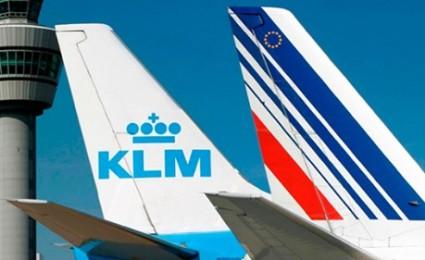Air France-KLM Cuts Year-End Capacity, Warns Of Widening Losses

PARIS—Air France-KLM Group said Air France expected to operate around 35% of its 2019 network passenger capacity and KLM about 45% in the fourth quarter, as the group reported a 2020 third-quarter (Q3) loss of €1.67 billion ($1.95 billion).
The Franco-Dutch airline group is expecting a “challenging” fourth quarter, with a substantially worse operating loss than the €442 million for the third quarter. For the full year, it expects network passenger activity to be less than half of 2019 levels.
The group said it saw a positive recovery trend until mid-August, after which passenger activity began to decrease, leading to the lower capacity outlook for fall and winter.
“There is limited visibility on the demand recovery curve as customer booking behavior is much more short-term-oriented and also highly dependent on the imposed travel restrictions, especially on the long-haul network,” Air France-KLM said. “The period of lockdown starting today [Oct. 30] in France is a new difficulty that will weigh on the group’s activities.”
Load factors are expected to decline in the fourth quarter, particularly for the long-haul network, and the airline group expects negative yields because of the delayed recovery in business traffic.
Third-quarter revenue fell 67% to €2.52 billion and the group reported a net loss of €1.67 billion, down from a €363 million profit in the year-ago period. The loss included a restructuring provision of €565 million, COVID-19-related over-hedging with a €39 million impact and a fleet impairment charge of €31 million.
Air France-KLM said it had €12.4 billion of liquidity or credit lines at its disposal as of Sept. 30. “The group should be able to make it to next summer, but after that will be dependent on a traffic recovery,” Bernstein analyst Daniel Roeska wrote in a research note, adding the group had made excellent progress on cost reduction. But, he added: “AF needs traffic to start recovering by summer 2021 or it will have to answer the question how it can secure more funds.”
Roeska also noted that while the group had reduced projected capacity for the fourth quarter as expected, its forecasts remain higher than those of other legacy carriers. Air France is targeting 35% of 2019 levels and KLM 45%, against 25% for Lufthansa and 30% for the International Airlines Group, with the higher goal due to cargo, Roeska said.
Air France-KLM CEO Ben Smith said: “We expect a challenging fourth-quarter 2020, with current forward bookings sharply down compared to last year.”
At its last set of financial results in July, Air France-KLM had said it was targeting 65% of capacity across the group in the fourth quarter.
As the crisis has progressed, the group has accelerated its cost-reduction and cash-preservation measures and is working with partners on various fronts, such as the development of rapid virus-detection tests that would allow traffic to recover, Smith said.
“Beyond these immediate and necessary measures, we are engaged in a more profound transformation of our group, with the objective of exiting this crisis in a stronger position, ready to address the future challenges of our industry,” Smith said. “Air transport will continue to connect people and cultures, but we foresee changes in customers’ expectations that we anticipate too.”
Early in the crisis, the group secured multi-billion-euro financial aid packages from its shareholders, the French and Dutch states. AF-KLM said it was accelerating its transformation plans and had submitted restructuring proposals to the two governments after discussions with unions.
Following Dutch media reports that the government had rejected KLM’s restructuring plan, the airline said the government was still assessing the plan and that unions were considering whether to agree to a specific “commitment clause” to be included between the airlines and unions. That clause commits employees to make contributions throughout the duration of the state loan and would allow the plan to be approved without being renegotiated. KLM is due to give the answer to the government by Oct. 31.
Future Of Alliance
A day before the company’s results were released, French Transport Minister Jean-Baptiste Djebbari once again raised the question of the future of the Air France-KLM alliance. It has become a politically charged subject, with the Dutch state unexpectedly building up its stake to match that of France’s in February 2019—seen as a sign that it wanted to exert more control over strategy.
In an Oct. 29 interview with Bloomberg, Djebbari said, “Do we really want an integrated company or not? Within a contract or integrated group, benefits have to be shared and equitable.”
In the group’s passenger network, Q3 numbers were down 71.3%, while capacity was 59.6% lower and load factor suffered a 46.9-point drop. Passenger revenues fell 77.4%.
“The passenger network activity was, as anticipated, strongly reduced, at around 40% of last year’s levels. The tightening of travel restrictions, border closures and absence of corporate travel delayed the expected traffic recovery,” the group said. “July and August were relatively strong in term of traffic compared to a disappointing September affected by restrictive travel measures.”
The group’s strategy was to operate only incremental cash-positive flights and several routes benefited from strong cargo demand to compensate for the paucity of passengers on board, it explained.
On the cargo side, the group reported a 31.7% increase in revenues, with load factors up 13.4 points. Capacity fell 33.3% thanks to the absence of belly holds on grounded passenger flights.
“On the demand side, worldwide airfreight volumes are down due to the COVID-19 crisis but are expected to rebound to 90-95% of pre-COVID-19 levels in 2021,” the group noted. “The supply-demand gap of the past months is foreseen to narrow as industry capacity supply will increase and will depend on the passenger traffic recovery.”





